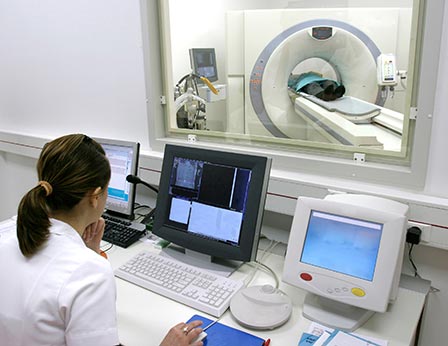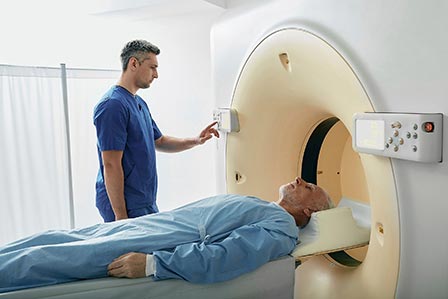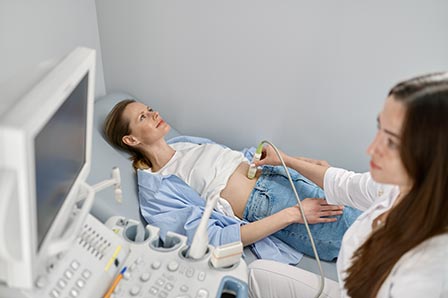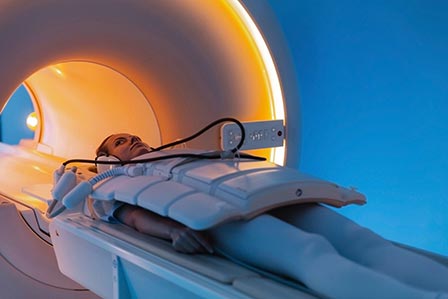Imaging/Scans
We provide the following services:

CT Scan
CT scan, also known as computed tomography, is a diagnostic imaging technique commonly used in gastrointestinal (GI) clinics to assess and evaluate various conditions affecting the digestive system. It offers valuable insights into the organs and structures of the abdomen and pelvis, aiding in the diagnosis and treatment planning for GI disorders.
The relevance of CT scans in a gastroenterology clinic is significant. CT scans provide detailed cross-sectional images of the abdomen and pelvis, allowing healthcare professionals to visualize and assess the liver, gallbladder, pancreas, spleen, intestines, and other digestive organs. These images can help detect and evaluate conditions such as inflammatory bowel disease, diverticulitis, bowel obstructions, gastrointestinal bleeding, and tumors.
CT scans can reveal important information about the size, location, and characteristics of abnormalities in the GI tract, assisting in accurate diagnosis and treatment decision-making. It can also help in planning surgical interventions or guiding other minimally invasive procedures.
In addition, CT scans can assess the extent of trauma or injury to the abdominal area, providing vital information for emergency situations or postoperative evaluations.
With its ability to provide detailed imaging and valuable diagnostic information, CT scans play a crucial role in the evaluation and management of GI conditions in a clinical setting. They enable healthcare professionals to obtain a comprehensive view of the abdominal region, contributing to effective diagnosis, treatment, and ongoing care for patients with GI disorders.
At ELEVATE Gastroenterology, we prioritize your comfort, safety, and the effective management of your gastrointestinal health. Trust our skilled medical team to deliver exceptional care through state-of-the-art imaging tests like CT scan. Contact us today to schedule your appointment and take a proactive step towards your digestive health.

MRI Scan
MRI, or magnetic resonance imaging, is a powerful diagnostic tool commonly used in various medical specialties, including gastroenterology, to evaluate and diagnose a wide range of gastrointestinal (GI) conditions. Its relevance in a GI clinic lies in its ability to provide detailed images of the internal structures and organs in the abdomen and pelvis.
In the context of a gastroenterology clinic, MRI offers several benefits. It provides high-resolution images that allow the gastroenterologist to assess the liver, gallbladder, pancreas, spleen, intestines, and other GI organs with great precision. This enables accurate detection and evaluation of conditions such as liver diseases, pancreatic disorders, bile duct abnormalities, and gastrointestinal tumors.
MRI is particularly useful in capturing soft tissue details, making it valuable for identifying and characterizing masses, cysts, or other abnormalities in the GI tract. It can help evaluate the extent of disease, monitor treatment response, and guide surgical planning.
Moreover, MRI is a non-invasive imaging technique that does not involve radiation exposure. It is generally safe and well-tolerated by patients, even those with certain medical conditions or contraindications to other imaging modalities.
By providing detailed and comprehensive imaging, MRI contributes to the accurate diagnosis, treatment planning, and ongoing management of GI conditions in a clinical setting. Its ability to visualize the intricate structures of the abdomen and pelvis makes it a valuable tool for gastroenterologists in their pursuit of optimal patient care.
At ELEVATE Gastroenterology, we prioritize your comfort, safety, and the effective management of your gastrointestinal health. Trust our skilled medical team to deliver exceptional care through state-of-the-art imaging tests like MRI scan. Contact us today to schedule your appointment and take a proactive step towards your digestive health.

Transabdominal Ultrasound
Ultrasound, also known as ultrasonography, is a widely used imaging modality in gastroenterology clinics due to its versatility and effectiveness in evaluating various gastrointestinal (GI) conditions. It utilizes sound waves to create real-time images of internal organs and structures, providing valuable diagnostic information.
Ultrasound is highly relevant in a GI clinic for several reasons. Firstly, it allows for the visualization of organs such as the liver, gallbladder, pancreas, spleen, and kidneys, as well as the GI tract itself. It helps detect and assess conditions such as liver diseases, gallstones, pancreatitis, abdominal masses, and gastrointestinal obstructions.
The real-time nature of ultrasound enables dynamic assessment of organ movement and blood flow, aiding in the evaluation of blood vessels, identifying abnormalities, and assessing vascular conditions such as portal hypertension or vascular malformations.
Furthermore, ultrasound is a non-invasive, radiation-free imaging technique, making it safe and well-tolerated by patients. It can be performed at the bedside, allowing for immediate imaging and quick assessment in emergency situations.
Ultrasound-guided procedures, such as biopsies or drainages, are routinely performed in GI clinics to aid in diagnosis or treatment. These procedures provide targeted guidance for accurate sampling or fluid drainage, minimizing risks and improving patient outcomes.
Overall, ultrasound plays a crucial role in the gastroenterology clinic, providing real-time imaging, assessing organ function, and guiding procedures. Its non-invasive nature, versatility, and ability to provide immediate results make it a valuable tool for diagnosing and managing various GI conditions, ultimately contributing to improved patient care.
At ELEVATE Gastroenterology, we prioritize your comfort, safety, and the effective management of your gastrointestinal health. Trust our skilled medical team to deliver exceptional care through state-of-the-art imaging tests like ultrasonography. Contact us today to schedule your appointment and take a proactive step towards your digestive health.

MR Elastography
MR elastography (MRE) is an advanced imaging technique that combines magnetic resonance imaging (MRI) with the measurement of tissue stiffness or elasticity. It is particularly relevant in gastroenterology clinics as it provides valuable information about liver fibrosis and other conditions affecting liver tissue.
The significance of MRE lies in its ability to assess liver stiffness, a key indicator of liver health. By using specialized imaging sequences, MRE can measure the stiffness of liver tissue, which is directly related to the presence and progression of liver fibrosis. This non-invasive technique offers an accurate and quantitative assessment of liver fibrosis, aiding in the diagnosis, staging, and monitoring of liver diseases such as chronic hepatitis, cirrhosis, and non-alcoholic fatty liver disease (NAFLD).
Compared to traditional methods such as liver biopsy, MRE is a non-invasive procedure that eliminates the need for tissue sampling. It provides a comprehensive evaluation of the entire liver and can detect fibrosis in its early stages when interventions may be more effective.
By providing precise and reliable measurements of liver stiffness, MR elastography helps healthcare professionals make informed decisions regarding patient management, including the initiation or adjustment of treatment plans, and the monitoring of disease progression over time.
In summary, MRE is a valuable tool in gastroenterology clinics, enabling non-invasive assessment of liver stiffness and fibrosis. Its ability to provide accurate and quantitative measurements of liver health contributes to the diagnosis, staging, and monitoring of liver diseases, leading to improved patient care and outcomes.
At ELEVATE Gastroenterology, we prioritize your comfort, safety, and the effective management of your gastrointestinal health. Trust our skilled medical team to deliver exceptional care through state-of-the-art imaging tests like MR elastography. Contact us to schedule your appointment and take a proactive step towards your digestive health.

CT scan, also known as computed tomography, is a diagnostic imaging technique commonly used in gastrointestinal (GI) clinics to assess and evaluate various conditions affecting the digestive system. It offers valuable insights into the organs and structures of the abdomen and pelvis, aiding in the diagnosis and treatment planning for GI disorders.
The relevance of CT scans in a gastroenterology clinic is significant. CT scans provide detailed cross-sectional images of the abdomen and pelvis, allowing healthcare professionals to visualize and assess the liver, gallbladder, pancreas, spleen, intestines, and other digestive organs. These images can help detect and evaluate conditions such as inflammatory bowel disease, diverticulitis, bowel obstructions, gastrointestinal bleeding, and tumors.
CT scans can reveal important information about the size, location, and characteristics of abnormalities in the GI tract, assisting in accurate diagnosis and treatment decision-making. It can also help in planning surgical interventions or guiding other minimally invasive procedures.
In addition, CT scans can assess the extent of trauma or injury to the abdominal area, providing vital information for emergency situations or postoperative evaluations.
With its ability to provide detailed imaging and valuable diagnostic information, CT scans play a crucial role in the evaluation and management of GI conditions in a clinical setting. They enable healthcare professionals to obtain a comprehensive view of the abdominal region, contributing to effective diagnosis, treatment, and ongoing care for patients with GI disorders.
At ELEVATE Gastroenterology, we prioritize your comfort, safety, and the effective management of your gastrointestinal health. Trust our skilled medical team to deliver exceptional care through state-of-the-art imaging tests like CT scan. Contact us today to schedule your appointment and take a proactive step towards your digestive health.
MRI, or magnetic resonance imaging, is a powerful diagnostic tool commonly used in various medical specialties, including gastroenterology, to evaluate and diagnose a wide range of gastrointestinal (GI) conditions. Its relevance in a GI clinic lies in its ability to provide detailed images of the internal structures and organs in the abdomen and pelvis.
In the context of a gastroenterology clinic, MRI offers several benefits. It provides high-resolution images that allow the gastroenterologist to assess the liver, gallbladder, pancreas, spleen, intestines, and other GI organs with great precision. This enables accurate detection and evaluation of conditions such as liver diseases, pancreatic disorders, bile duct abnormalities, and gastrointestinal tumors.
MRI is particularly useful in capturing soft tissue details, making it valuable for identifying and characterizing masses, cysts, or other abnormalities in the GI tract. It can help evaluate the extent of disease, monitor treatment response, and guide surgical planning.
Moreover, MRI is a non-invasive imaging technique that does not involve radiation exposure. It is generally safe and well-tolerated by patients, even those with certain medical conditions or contraindications to other imaging modalities.
By providing detailed and comprehensive imaging, MRI contributes to the accurate diagnosis, treatment planning, and ongoing management of GI conditions in a clinical setting. Its ability to visualize the intricate structures of the abdomen and pelvis makes it a valuable tool for gastroenterologists in their pursuit of optimal patient care.
At ELEVATE Gastroenterology, we prioritize your comfort, safety, and the effective management of your gastrointestinal health. Trust our skilled medical team to deliver exceptional care through state-of-the-art imaging tests like MRI scan. Contact us today to schedule your appointment and take a proactive step towards your digestive health.
Ultrasound, also known as ultrasonography, is a widely used imaging modality in gastroenterology clinics due to its versatility and effectiveness in evaluating various gastrointestinal (GI) conditions. It utilizes sound waves to create real-time images of internal organs and structures, providing valuable diagnostic information.
Ultrasound is highly relevant in a GI clinic for several reasons. Firstly, it allows for the visualization of organs such as the liver, gallbladder, pancreas, spleen, and kidneys, as well as the GI tract itself. It helps detect and assess conditions such as liver diseases, gallstones, pancreatitis, abdominal masses, and gastrointestinal obstructions.
The real-time nature of ultrasound enables dynamic assessment of organ movement and blood flow, aiding in the evaluation of blood vessels, identifying abnormalities, and assessing vascular conditions such as portal hypertension or vascular malformations.
Furthermore, ultrasound is a non-invasive, radiation-free imaging technique, making it safe and well-tolerated by patients. It can be performed at the bedside, allowing for immediate imaging and quick assessment in emergency situations.
Ultrasound-guided procedures, such as biopsies or drainages, are routinely performed in GI clinics to aid in diagnosis or treatment. These procedures provide targeted guidance for accurate sampling or fluid drainage, minimizing risks and improving patient outcomes.
Overall, ultrasound plays a crucial role in the gastroenterology clinic, providing real-time imaging, assessing organ function, and guiding procedures. Its non-invasive nature, versatility, and ability to provide immediate results make it a valuable tool for diagnosing and managing various GI conditions, ultimately contributing to improved patient care.
At ELEVATE Gastroenterology, we prioritize your comfort, safety, and the effective management of your gastrointestinal health. Trust our skilled medical team to deliver exceptional care through state-of-the-art imaging tests like ultrasonography. Contact us today to schedule your appointment and take a proactive step towards your digestive health.
MR elastography (MRE) is an advanced imaging technique that combines magnetic resonance imaging (MRI) with the measurement of tissue stiffness or elasticity. It is particularly relevant in gastroenterology clinics as it provides valuable information about liver fibrosis and other conditions affecting liver tissue.
The significance of MRE lies in its ability to assess liver stiffness, a key indicator of liver health. By using specialized imaging sequences, MRE can measure the stiffness of liver tissue, which is directly related to the presence and progression of liver fibrosis. This non-invasive technique offers an accurate and quantitative assessment of liver fibrosis, aiding in the diagnosis, staging, and monitoring of liver diseases such as chronic hepatitis, cirrhosis, and non-alcoholic fatty liver disease (NAFLD).
Compared to traditional methods such as liver biopsy, MRE is a non-invasive procedure that eliminates the need for tissue sampling. It provides a comprehensive evaluation of the entire liver and can detect fibrosis in its early stages when interventions may be more effective.
By providing precise and reliable measurements of liver stiffness, MR elastography helps healthcare professionals make informed decisions regarding patient management, including the initiation or adjustment of treatment plans, and the monitoring of disease progression over time.
In summary, MRE is a valuable tool in gastroenterology clinics, enabling non-invasive assessment of liver stiffness and fibrosis. Its ability to provide accurate and quantitative measurements of liver health contributes to the diagnosis, staging, and monitoring of liver diseases, leading to improved patient care and outcomes.
At ELEVATE Gastroenterology, we prioritize your comfort, safety, and the effective management of your gastrointestinal health. Trust our skilled medical team to deliver exceptional care through state-of-the-art imaging tests like MR elastography. Contact us today to schedule your appointment and take a proactive step towards your digestive health.
